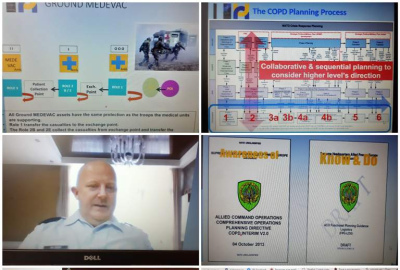Operations Staff Officers Training Course
- Головна >
- The University >
- News >
- Operations Staff Officers Training Course

Historical and contemporary experience of warfare, armed conflicts shows that logistics is the most important component of all types of operations without exception. The success of each war, operation depends on an integrated approach to the planning process, comprehensive and most complete and high-quality supplies of troops with everything necessary at all stages of operations, ensuring the movement and transportation of personnel and materiel to an area of operations, accumulation of equipment, fuel, food, water and their storage, the organization of appropriate living conditions and many other issues. In some countries there is a practice that the appointment of an officer to a command position such as, for example, a regiment commander is possible only with his/her prior experience serving as a logistics officer.
Thus, from the 16th to 21st of November 2020, within the framework of the training module “Fundamentals of Operational Sustainment (NATO Logistics” the students of the Joint Staff Officers L-3 course discussed in detail the logistics operations
(in English) in accordance with NATO documents.
Taking into account the unfavorable epidemiological situation, the classes were held online using the means of modern information technologies of the advanced distributed learning platform of the Scientific ADL Center of the University and BigBluButton software that allowed ensuring the necessary quality of mastering the educational material by the students.
In order to conduct the classes the university teachers with relevant knowledge in the field of logistics, experience in military service on command and staff positions at operational and strategic levels as well as with combat experience of participation in Joint Force Operation, Antiterrorist Operation in the East of Ukraine and international peace support operations under the auspices of NATO, UN in different countries of the world were involved.
With the assistance of the NATO Liaison Office in Ukraine, NATO Strategic Advisers on Logistics, Colonel of the Armed Forces of the Czech Republic JAN HUSAK PhD (OF-5 (GS)) and Colonel of the Armed Forces of Poland ZBIGNIEW LENARCZYK, Ph.D. (OF-5) took part in the training. It is worth noting that the involvement of the foreign advisers from NATO with a high level of training and competence allowed the students to gain knowledge and experience of working in a multinational environment, as well as to improve the English language proficiency level.
During the five days of the training, the students examined the general principles, functions and the logistics-related NATO policy documents, doctrines, multinational logistics standards, interoperability issues, the concept and structure of NATO Response Forces (NRF) and their tasks in operations, the structure and tasks of the Combined Joint Task Force and its logistics support, organization of the troops (forces) movement during the operation in the area of operations, support of troops due to the contracting and related financing.
The students focused on the specifics and procedure of the logistics planning process at various levels of command in accordance with the NATO Comprehensive Operational Planning Directive, troops strategic deployment in multinational operations, medical support, and the organizational structure and tasks of the Joint Logistics Support Group in the theater of operations, etc.
The experience of co-operation in teaching process of officers-instructors of the Armed Forces of Ukraine, who have a contemporary practical experience in operations, including coalitional ones and foreign instructors with relevant experience, is extremely valuable for implementing the best practices and approaches to professional military education adopted in NATO member states and it is a priority for the university.
A direct (without translation) exchange of views, knowledge and experience among students, academic staff and foreign instructors allows them to comprehend NATO standards better and ensure the interoperability of the course’s graduates with their foreign colleagues.





